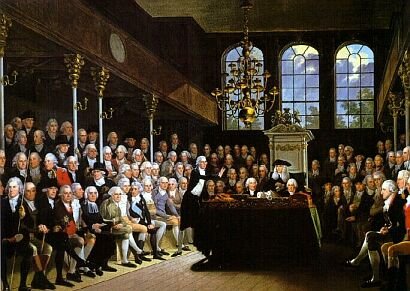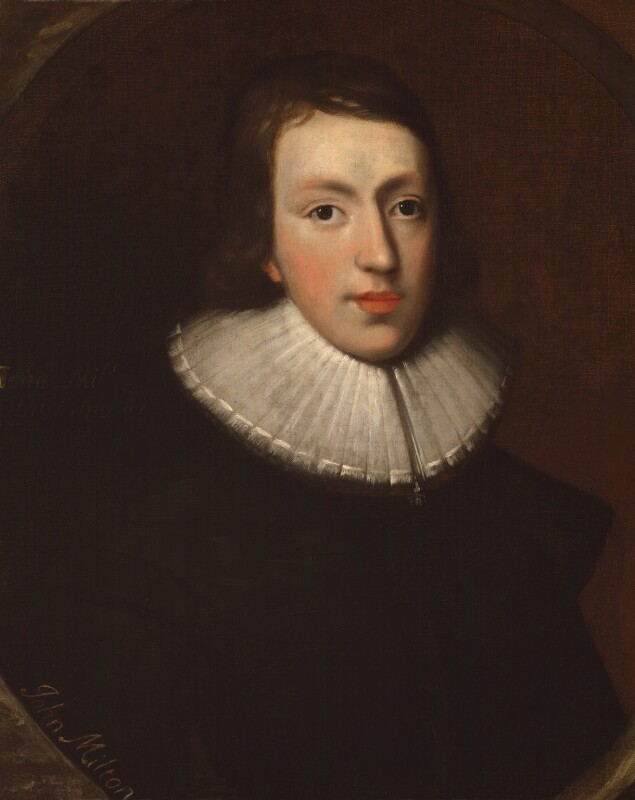Algernon Sidney is far from being a household name and is probably less well known even among scholars than his uncle Sir Philip Sidney, author of Arcadia. Among those who are familiar with the younger Sidney, he is generally famed less for his published works than for two facts about what he wrote. First, his own words were used to convict him of treason in 1683, resulting in his execution. The manuscript of the work that became the Discourses Concerning Government was said to have been on Sidney's desk at the time of his arrest in May 1683 for his alleged involvement in the Rye House Plot. Those manuscript pages were subsequently used as a 'witness' against him at his trial, held later that year. Secondly, when working as a diplomat in Denmark, Sidney wrote the following inscription in the signature book of the University of Copenhagen:
MANUS HAEC INIMICA TYRANNIS
EINSE PETIT PLACIDAM CUM LIBERTATE QUIETEM
('This hand, always an enemy to tyrants, seeks a little peace under liberty.'). (Jonathan Scott, Algernon Sidney and the English Republic, 1623-1677. Cambridge University Press, 1988, p. 133).
Next year marks the four hundredth anniversary of Sidney's birth. Though originally planned for April 2020, only to be disrupted by the Covid-19 pandemic, the conference held in the French town of Rouen in April 2022 might now be seen as an early celebration of that anniversary. The conference was organised by Christopher Hamel and Gilles Olivo. Christopher has recently produced a modern edition of the 1702 French translation of Sidney's Discourses by Pierre August Samson, to which he has added a rich scholarly introduction that surveys the reception of Sidney's thought in eighteenth-century France. This was the first conference I have attended in-person - and my first trip abroad - since January 2020. As such it was a particular pleasure to be able to attend.
As always, what I offer here are my own reflections on the papers delivered rather than a full account of every paper. Three themes in particular struck me as I listened to the contributions: the relationship between theory and practice in republican thought; the value of adopting a European perspective to English republicanism; and the views of Sidney (and others) on prerogative power and its relationship to popular sovereignty.
Theory and Practice in Republican Thought
Algernon Sidney, after Justus van Egmont, based on a work of 1663. National Portrait Gallery, NPG 568. Reproduced under a Creative Commons Licence.
Scholarly accounts of Sidney's thought have tended to place emphasis on his writings, and in particular the Discourses Concerning Government and Court Maxims. While not dismissing the importance of these writings and the ideas contained within them, Tom Ashby's excellent opening paper focused on Sidney's actions and writings as a diplomat working on behalf of the English Commonwealth and Free State. He expertly demonstrated how the letters that Sidney wrote to King Charles Gustavus of Sweden, and King Frederick of Denmark, in August 1659 effectively embody his republican principles in the way in which he presented himself to, and engaged with, his royal correspondents. Sidney's role as a martyr has long been central to the understanding of him and his ideas, but his role as an agent of the English republic has received far less attention, and the glimpse into this that Tom offered suggests it has the potential to greatly enrich our understanding of Sidney's thought. I eagerly await the opportunity to read his finished thesis - and the publication of the article he is preparing on these letters.
As I noted in my own paper, political action (negotium) was crucial for republican authors. I argued that figures like Sidney and James Harrington (as well as their later editors, printers, and translators) used the literary and material dimensions of their texts not merely to convey ideas in a passive form but to encourage readers to engage more deeply with those ideas and even to venture into action.
Encouraging political action was, of course, also central to the Leveller movement, which has been richly studied by Rachel Foxley, John Rees, and others. Rachel's paper, which compared the ideas of the Levellers on the nature and role of parliament with those of Sidney, also touched on questions of the interaction of thought and practice. Specifically, Rachel explored the ways in which Levellers - such as Richard Overton - in the 1640s and Sidney in the 1680s grappled with the pressing problem of the relationship between a sovereign people and its representatives; and how (if at all) those representatives might be made accountable to those they represented.
One of the problems of engaging with ideas in action that was discussed in response to these papers is whether this makes it harder to identify a coherent - and consistent - political theory. The question of whether a consistent political theory can be constructed from the various petitions and pamphlet writings of the Levellers has already been addressed by Rachel and others, but the question is equally applicable to Sidney. Christopher noted this in his introduction to the conference, asking whether it is possible to talk of coherence when Sidney himself did not complete or publish either of his major works. Building on this, Tom's paper raised the question of whether it is appropriate to treat Sidney's diplomatic letters as texts in the history of political thought. It certainly seems as though there would be value in doing so, not least because - as Tom pointed out - they provide a useful counterpart to the Court Maxims. In that dialogue Sidney attempts to persuade the people of his ideas on government, whereas in his diplomatic correspondence his aim is to persuade kings. Moreover, as both Rachel's paper and that by François Quastana made clear, the problem of consistency also arises in the Discourses. Because Sidney's aim in that text is to refute the arguments of Robert Filmer, he sometimes ends up contradicting himself. Rachel showed this very clearly in relation to his arguments about representation. In some places he presents representatives as servants, and so insists that those who elect them must be able to instruct them. Elsewhere his views reflect a more aristocratic understanding of representatives, arguing that they must be given the freedom to make their own decisions, and that they cannot be held to account by their constituents. Similarly, François showed that while Sidney castigates Filmer for drawing a parallel between kings and fathers, he himself draws a similar (and equally problematic) parallel between brothers and citizens.
The Value of a European Perspective
Since the motivation behind this conference was the publication of Christopher's excellent edition of the French translation of Sidney's Discourses, it should come as no surprise that the importance of adopting a European perspective to English republicanism was another theme that was raised by various participants. Again Tom's paper was pioneering in this regard showing (as Gaby Mahlberg's recent book on the English Republican exiles has also done) just how much material is available in foreign archives on the English republic and English republicans.
A typical Rouen building. Image by Rachel Hammersley
As other papers made clear, the European approach is important not just with regard to individuals but also texts. François reminded us how much both Filmer and Sidney owed to French political models; including both, on the one hand, the writings of Jean Bodin and, on the other, those of the monarchiens. In her paper, which offered a stimulating comparison of the reception of the ideas of Sidney and Harrington in eighteenth-century France, Myriam-Isabelle Durcrocq made the important point that studying the French reception of the works of these thinkers not only reveals much about French Huguenot and Enlightenment thought, but also illuminates English republicanism itself. It draws our attention to the different preoccupations of Sidney and Harrington (which led to their works being celebrated in France at different points in time and by individuals facing very different concerns). This highlights the fact that there was not just one single strain of English republican thought, but rather several distinct varieties.
Prerogative Power and Popular Sovereignty
Of course, as Myriam-Isabelle rightly noted, while Harrington and Sidney diverged on various points, two principles on which they firmly agreed were, first, the evils of arbitrary power (or the power of one) and, secondly, the sovereignty of the people. One reflection of this in Harrington's work (as she reminded us) is that Harrington called his popular assembly the Prerogative tribe, alluding to the fact that the prerogative power lies not with any king or prince but with (as Harrington puts it in Oceana) the 'king people'. Sidney embodies a similar idea in his engagement with the Kings of Sweden and Denmark in the letters discussed by Tom. Not only does he clearly believe that, as a representative of the English commonwealth, he can speak directly and on equal terms with royalty, but he also warns Gustavus to adjust his behaviour and to act in the interests of the common good rather than arbitrarily for his own personal gains - or risk republican violence being launched against him.
Algernon Sidney by James Basire after Giovanni Battista Cipriani, 1763. National Portrait Gallery, NPG D28941. Reproduced under a Creative Commons Licence.
The attitude to prerogative power was also, as Alberto de Barros pointed out in his paper, a fundamental dividing line between Sidney and John Locke in their respective responses to Filmer's Patriarcha. While both were critical of the prerogative power of kings, Locke was willing to accept that it might legitimately be exercised under two distinct circumstances. First, at moments of crisis or emergency; and, secondly, when the law is silent on a particular point and interpretation is therefore required. Locke was clear, however, that in these cases the prerogative (in order to be legitimate) must only be used to advance the common good. Sidney, by contrast, was adamant that any power that operates above the law is illegitimate; that the very existence of a royal prerogative would undermine liberty and constitute a violation of the common good.
As I hope this blogpost demonstrates, I learned a huge amount from all the papers at this excellent event; as well as from our stimulating and fruitful discussions, which continued over drinks and meals. As I sat on the train leaving Rouen (somewhat reluctantly), I was struck by a parallel between the ideas I had been having about the conference discussions and my experience of attending a conference for the first time in two years. Sidney not only thought and wrote about republican principles, but also embodied them in his engagement with rulers such as the Kings of Sweden and Denmark, developing and extending his thought in the process. Similarly, in attending this conference I moved from contemplation of his thought to engagement with others, was led to interact with individuals coming from different countries and intellectual traditions, and ultimately had my perspectives challenged - resulting in a richer and deeper understanding of Sidney and his ideas.











